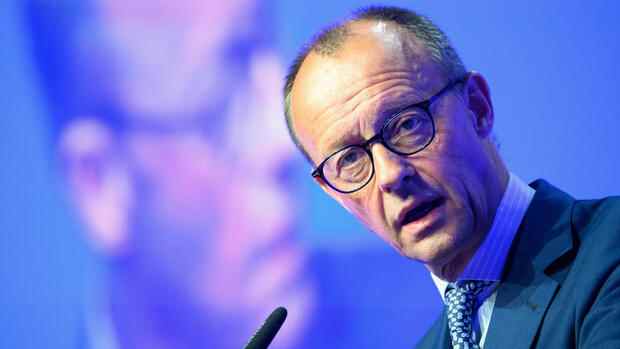Friedrich Merz was able to stabilize his party in the polls.
(Photo: dpa)
Berlin. The war in Ukraine is not only forcing the traffic light coalition back into reality – the CDU and CSU are also having to ask themselves what will happen to Germany and Europe, which is poor in raw materials. Leading Union politicians have long self-critically described the “energy transition” proclaimed by Angela Merkel as a failure.
After almost a year in opposition, the CDU is beginning what should be a matter of course for a party after 16 years of government: a critical inventory of its own actions.
The CDU has set up two commissions: One adjusted the party’s canon of values a little in no time at all. The other should talk about principles and attitudes on the basis of values. The party gave itself two years to become a modern people’s party again as a result with a new basic program.
Does the Union have the time to do so in these times? After all, it sees itself as a governing party and not as a programmatic party like an SPD or the Greens.
Top jobs of the day
Find the best jobs now and
be notified by email.
It’s one thing for the opposition leader to travel to Kyiv or Warsaw and expose the Chancellor’s weaknesses to the media. In view of the imploding working basis of the coalition, it is also not difficult to create further discord with motions in the Bundestag.
Friedrich Merz can point to successes in this regard and may thus stabilize his party in the polls. But what the CDU and CSU claim for themselves is another matter: wanting to be a constructive opposition.
>> Read also: “Greens only act when their backs are against the wall” – Union demands fast nuclear concept
The task is certainly not to show the coalition the way out of the adversities of war and the rubble of the collapsing world economic order as we have known it since the fall of the wall. The fact is: the Union ruled the country for 25 years after 1989 and helped shape the world. And so it would be appropriate to say how a bourgeois party imagines the new world and how it intends to satisfy the country’s thirst for energy in the future and thus maintain prosperity in the country.
At the federal party conference in September, however, other topics are in the foreground: organizational issues of the party, from the women’s quota to parental leave for officials. They may be important issues for the CDU.
In these times, however, the world wants to know how a CDU would shape with responsibility. It would be heard, since Germany has once again decided to get out of something without knowing what it wants to get into.
This time it’s not nuclear energy, but Russian gas. Once again there is no plan, again there was an external shock at the beginning. Again, a weather-independent and easily controllable energy production is in question. Should the solution be: Germany celebrates itself as the green electricity world champion and, due to a lack of storage, diligently exports wind and sun when the weather is good and silently imports coal and nuclear power when the weather is bad?
European solidarity must look different. A European party like the CDU could develop an idea of this: an energy union with a European energy mix and power grid that unites the continent and makes it independent of authoritarian powers that do not follow our values.
Since everyday government swallows up the SPD, Greens and FDP, it would be up to the Union to present a solid concept and thus present itself as an alternative. Instead, Germany is discussing what the Union planned more than a decade ago: returning to nuclear energy. The debate may be good in Lower Saxony and Bavaria, where citizens will elect new state parliaments in October of this year and next year. However, it is not a plan.
More: No joint program – the coalition argues about climate protection.
